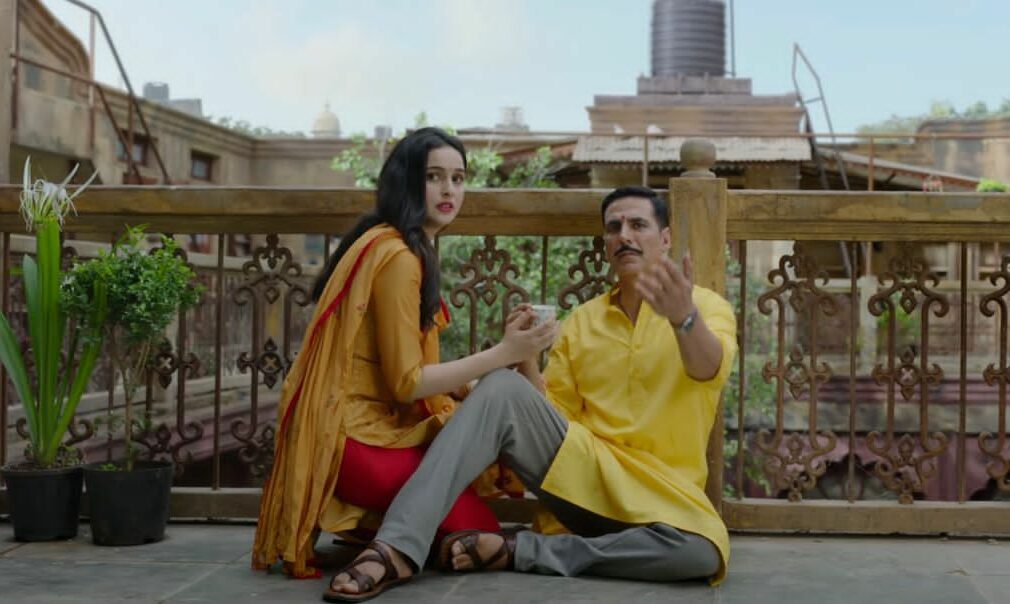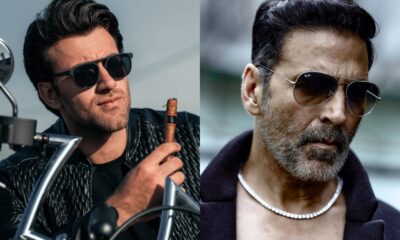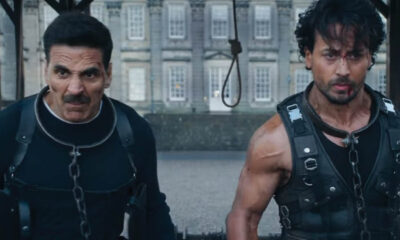Movie Reviews
Raksha Bandhan Review: An epic misfire on every level.
In a film based on dowry, female characters have almost nothing to say. That is just one of the many problems with this film.
Published
2 years agoon

Raksha Bandhan
Director: Aanand L. Rai
Writers: Himanshu Sharma, Kanika Dhillon
Cast: Akshay Kumar, Bhumi Pednekar, Sadia Khateeb, and ensemble
Released in theatres.
Calling Raksha Bandhan the least accomplished film of Aanand L Rai would still give the film some merit. But Raksha Bandhan is simply bad. Rai has given a voice to complex human beings and their equally complex feelings and emotions in his previous films. This film’s tagline says, “Return to emotions.” But what we get to see is a series of loud and forced situations one after the other. I thought for a few seconds about whether to call it a narrative or not. But decided against it.
Raksha Bandhan begins with Akshay Kumar in another outing with a fake mustache frantically trying to reach his home because ‘ladkewale’ have come to see his eldest of four sisters (Sadia Khateeb). The ‘deal’ is not done because some other ‘party’ is willing to give more dowry than Akshay’s Lala Kedarnath. Lala has vowed in front of his dying mother that he will not marry till all of his four sisters are not married. That has in turn put Sapna’s (Bhumi Pednekar) dream of marrying Lala, or Kedara as she affectionately calls him, on hold. The age difference between Lala and Sapna in turn between Akshay and Bhumi is bluntly stated by Sapna’s father, as if not to irk people objecting to Akshay’s pairing with actresses almost half his age.
Also read: Laal Singh Chaddha Review: A worthy adaptation
Dowry is a serious issue in the B, C, and below regions of India. Having a sensitive director, and a writer duo, one of which is apparently a feministic voice (Kanika Dhillon), should have ensured to tell a poignant tale of the plight of girls and their families. But that is not the case. To call the film preachy would mean that there’s at least some knowledge being imparted. But everything coming from the mouths of these characters reeks of double standards and senselessness.
The four sisters don’t look like siblings. They exist so that writers can comment on body shaming. One sister is dark-skinned and the other one is obese. The fourth one is tomboyish. Gayatri, played by Sadia, is the eldest, and the prettiest is Lala’s most ‘honhar and achhi’ sister. While the writers are telling that the girls should not be shamed for their skin color or weight or personality type, they’re showing the pretty and simple one as the most ideal girl. They top it up by shaming two prospective twin grooms for having a stammer. Bhumi Pednekar, who is vocal about body positivity and sexuality, through her films or otherwise, happily walks through a sequence where Lala is amazed by how an overly obese girl could find a groom to marry. In another scene, she laughs when a matchmaker (Seema Pahwa) says about the tomboyish sister, “Isko Sunny Deol se Sunny Leone banana padega.”
Also read: “She was worried that no one would marry her son now,” says Vijay Varma on his mom’s reaction to Darlings!
Here are another two problematic instances among many throughout the film. After beating some guys for eve-teasing his sisters, Lala gives a loud speech on how to treat women only to end it by saying that any guy who eve-teases a girl will have to marry her. So, if a guy wants to marry a girl but she’s not entertaining him, all that he has to do is to eve-tease her so that he can by default marry her? C’mon. The second instance is towards the end of the film when Lala claims that he will make his sisters so able that they will get dowry from the guys who want to marry them. Phew.
Isn’t it ironic that in a film on dowry, the female characters have absolutely nothing to say or do? It is all about Lala’s determination and promise of marrying his sisters into good families. One fine day, the matchmaker tells Lala that Gayatri’s marriage has been fixed. Lala doesn’t bother asking anything about the guy. Gayatri doesn’t get to meet the guy before she marries him. You know that one tragedy is going to wake up Lala. By the time that happens, the tragedy holds no impact. It merely becomes a tool for Lala to give another speech.
Also read: Urvashi Rautela hits back at the jibe of Rishabh Pant with this savage reply
Lala realizes that his sisters should get good education only in the climax and in the epilogue, one sister becomes a lawyer and another one becomes a police officer. What exactly happens to the dark-skinned sister other than her marriage with the guy originally chosen for Sapna is unknown. And Sapna for that matter is seen throughout the film either yelling or sobbing because Lala won’t marry her till his sisters are married.
A lackluster script such as this doesn’t give anything for the actors to perform anyway. Akshay Kumar is his usual self. The opening sequence where he is frantically trying to rush through a busy Chandni Chowk is symbolic of how this film must have been wrapped up. You may wonder what could have made Bhumi Pednekar, an otherwise reliable performer, say yes to her one-note Sapna. Sadia Khateeb who made a striking debut with Shikara has been reduced to a prop. And so are other actors playing the sisters. Raksha Bandhan is an epic misfire on every level.
You may like


Bade Miyan Chote Miyan review: Action packed and gritty!


Akshay Kumar: “Bade Miyan Chote Miyan is the finest product I have worked in”


Akshay Kumar on his camaraderie with Tiger Shroff: “After very long I’ve got someone who plays sporty games with me”


Actor Rohed Khan: “I got into martial arts because of Akshay Kumar sir”


Akshay Kumar on his choice of films: “I don’t stick to one kind of genre”


Bade Miyan Chote Miyan trailer: Akshay Kumar and Tiger Shroff sets the stage for an high-octane actioner












